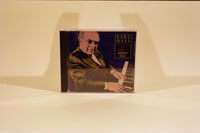 Haas, Karl, National Humanities Medal, 1991
Haas, Karl, National Humanities Medal, 1991
CD "The Romantic Piano" and statement on development of recorded music and
radio broadcasting of it
" A century ago, in the year 1900, the great American composer Aaron
Copland was born. In the same year, the American scientist R.A. Fessenden
transmitted human speech via radio waves for the first time. The greatest
impact on my field, classical music, in the 20th century is the ability to
broadcast music via sound waves throughout the world and the advent of
inexpensive musical recordings to store musical sounds...In America in the
early 1900's, citizens who enjoyeed classical music as a reminiscence of
the Old World were able to hear it only in conert halls, played and sung
by local or traveling musicians. Few people experienced classical music
until radio broadcating began. In 1920 the first American radio station
began broadcasting from Pittsburgh, Pennsylvania...the storage of music
has advanced through wax rolls to one-sided records to two-sided records
to vinyl records to cassette tapes to digital-audio tape t plastic compact
discs recorded on a laser. Most Americans can afford to urchase the world's most glorious music. And that accessibility, that return of their musical heritage to the people, signifies the democratization of this art form and a boon to humankind. In this spirit, I humbly contribute my compact disc, The Romantic Piano, for inclusion...It reflects the structure and sound of my radio program...which has aired continuously on American radio for 40 years -- the world's longest running daily classical radio program...I hope and predict that we will continue to celebrate great composers and allow their music to lift our souls and ennoble our spirits. How their music will come to us, the modes of delivery and ways of hearing, will be one of the miracles of the future."
|

